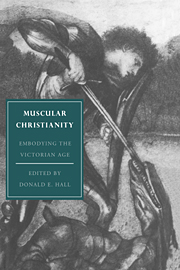Book contents
- Frontmatter
- Contents
- List of contributors
- Acknowledgments
- INTRODUCTION
- PART I FOUNDATIONS OF MUSCULAR CHRISTIANITY
- 1 The volcano and the cathedral: muscular Christianity and the origins of primal manliness
- 2 On the making and unmaking of monsters: Christian Socialism, muscular Christianity, and the metaphorization of class conflict
- 3 Christian manliness and national identity: the problematic construction of a racially “pure” nation
- PART II VARIETIES OF MUSCULAR CHRISTIANITY
- PART III RESPONSES TO MUSCULAR CHRISTIANITY
- Index
3 - Christian manliness and national identity: the problematic construction of a racially “pure” nation
from PART I - FOUNDATIONS OF MUSCULAR CHRISTIANITY
Published online by Cambridge University Press: 05 March 2010
- Frontmatter
- Contents
- List of contributors
- Acknowledgments
- INTRODUCTION
- PART I FOUNDATIONS OF MUSCULAR CHRISTIANITY
- 1 The volcano and the cathedral: muscular Christianity and the origins of primal manliness
- 2 On the making and unmaking of monsters: Christian Socialism, muscular Christianity, and the metaphorization of class conflict
- 3 Christian manliness and national identity: the problematic construction of a racially “pure” nation
- PART II VARIETIES OF MUSCULAR CHRISTIANITY
- PART III RESPONSES TO MUSCULAR CHRISTIANITY
- Index
Summary
Recent work in cultural and literary studies has come to question the common assumption that each nation-state embodies its own particular culture. As anthropologists Akhil Gupta and James Ferguson observe, “[The] assumed isomorphism of space, place, and culture results in some significant problems” (7); what happens, they ask, to “Indian culture” in England? What of (post)colonial cultures and the effect they have upon their (former) masters: “To which places do the hybrid cultures of postcoloniality belong? Does the colonial encounter create a ‘new culture’ in both colonized and colonizing country, or does it destabilize the notion that nations and cultures are isomorphic?” (7–8). Gupta and Ferguson's questions follow naturally from Edward Said's contention that “the experience of imperialism [be taken] as a matter of interdependent histories, overlapping domains” (49–50).
My concern is with Gupta and Ferguson's second question as it applies to the origins of muscular Christianity. In the 1850s, Charles Kingsley helped create a masculinist image of an imperial English nation concerned with formal territorial expansion, one that was in reaction to an older mercantilist imperialism of free trade committed to the imperatives of progressive society. Kingsley's literary and historical investigations of the “primitive” in both European and non-European cultures – which provide an important representative instance of Said's “overlapping domains” – helped give impetus to the rise of late-Victorian New Imperialism. While the analysis of one figure's work cannot answer the question of what new cultures may have emerged as the result of the various moments of colonial encounter, it certainly suggests that nations and cultures are never isomorphic.
- Type
- Chapter
- Information
- Muscular ChristianityEmbodying the Victorian Age, pp. 66 - 88Publisher: Cambridge University PressPrint publication year: 1994
- 6
- Cited by



